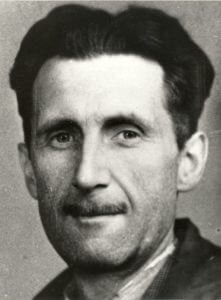Shooting an Elephant, written in the form of a memoir, presents George Orwell‘s anxieties and negotiations with the condition of colonialism. Authors down the ages have continuously expressed their concerns with what they find disturbing a certain balance in self or society. For Orwell, this expression is seen in his writings that have stood the test of time. In his essay, Shooting an Elephant, he makes no effort to conceal his agitated mind. This conflict arose from his awareness of the difference between public expectation and his natural impulses. His constant probing into the hollowness of the Imperial regime illuminates his insecurity in being a part of the system. Imperialism, for him, becomes not a state of empowerment, but of enslavement, imposing on him an unending feeling of guilt.

This urge is so deeply ingrained in him that he feels like wearing a mask all the time: “only an absurd puppet pushed to and fro by the will of those yellow faces behind.” The mask is that of a powerful ruler, ready to undertake any risk. While the sensitive man inside would recoil from the idea of killing an innocent harmless and precious animal like an elephant, the mask outside would not let him do otherwise. He realises how colonialism jeopardizes the freedom of both imperialist and colonized. His decision to carry the rifle was based on a defensive strategy whereas the choice was taken away from him at the time of action, the only reason being “one long struggle not to be laughed at”.

This absence of choice is the ultimate conflict in Orwell’s mind. He goes on describing the elephant using words like “grandmotherly air”, “a hundred pounds worth” and “calmness” the irony of the situation is that whatever fear Orwell felt was not so much for the elephant, but for the crowd of natives behind him. Therefore, the individual falls prey to the generalized idea of a Saheeb. Not that he was afraid of death, but of a death similar to the natives’— “pursued, caught, trampled on and reduced to a grinning corpse like that Indian.” He was afraid of being laughed at, he had to assert his difference.
It is this difference that gets highlighted after the elephant meets its end. The devilish roar of cheering natives is set against the overpowering and silencing guilt of the executioner. The Saheeb wished to speed up death to reduce suffering, the natives hardly bothered about it. Orwell emphatically uses the expression about the elephant being “powerless to move and yet powerless to die”. This almost echoes the state of British rule in the colonies.
Nevertheless, the feeling of superiority continues in Orwell who dismisses the claims of the Indian owner of the elephant since the Indian is powerless. The attitude of the Europeans, especially the younger ones is even more peculiar who thought that Orwell took the revenge of the coolie’s death because the elephant is more useful. Finally, the whole experience of shooting an elephant becomes a treacherous consolation for Orwell who justifies his action based on the death of the coolie which is not the real case at all. In forfeiting his own reality, Orwell becomes a victim of spiritual death, a numbness characteristic of Imperialism and its perpetrators.




